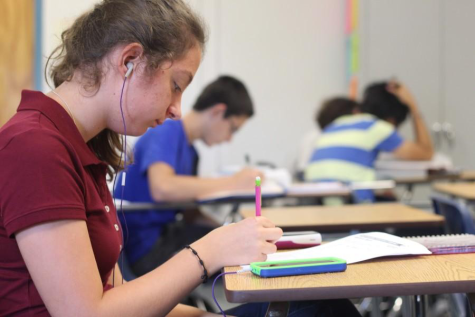
You probably have a teacher who doesn’t allow the use of cellphones in class. This class may feel boring or time-consuming, or even energy-consuming. Teachers wonder why students have a hard time paying attention in class, even if those same students are doing better in other classes. It’s mainly because all they can think about is who texted them or who made new Instagram posts.
Phones have developed over the years and are a great distraction to many people. One small notification can take someone off track for the rest of their day. As people grow up, the need for and use of phones increases. Currently, most middle schools do not allow their students to have their phones out during class and punish those who use them.
High school students have a greater craving for phones. During class time, students sometimes ask their teacher if they can listen to music while doing their assignments. Some teachers may say no, thinking that the music will distract their students from their work. However, the reality is that music helps students focus more during writing, math, science, and physical education classes.
One benefit that music has is overcoming writer’s block. An article from Christopher Fielden states, “I experienced a serious wave of writer’s block. After trying countless writing exercises, I decided to use music as a way to trigger different ideas and emotions.” This is very common for people who have a difficult time coming up with new ideas. Music helps trigger inspiration and feelings that may be difficult to receive otherwise.
An article from Florida National University talks about the importance of a positive emotional state, in order to improve “cognitive function”. The author states, “If you want to improve brain performance while studying, evidence now shows that you must first improve your emotional state by listening to music that you enjoy!” Music helps a person with their emotions, and this can help students to better understand their schoolwork.
 According to the same article, studies show that students who listen to music while doing assignments can activate a part of the brain that helps with concentration. “One older study found that listening to music allowed test takers to complete more questions in the time allotted and get more answers right,” the article claims.
According to the same article, studies show that students who listen to music while doing assignments can activate a part of the brain that helps with concentration. “One older study found that listening to music allowed test takers to complete more questions in the time allotted and get more answers right,” the article claims.
And the same article also suggests that another reason students should “listen to music during a study session is because music is proven to help improve cognitive performance.” Students who listen to music help get more answers correct, compared to those who don’t. The music helps stimulate the brain and improve its functions.
Another article from the National Center of Safe Supportive Learning Environment states that music helps reduce stress and anxiety in a person while they are doing work. According to the author, “Several studies on the effects of experiencing calm music have suggested that it can reduce aggressive behavior and regulate moods, particularly feelings of anxiety and stress.” The calmer a person is, the more work that can be done.
As you can see, music is proven to be one of the most useful brain tools that may encourage students to do their best work. Music provides so many benefits, especially for people with developing brains, like teenagers. Therefore, cell phones are not a distraction if used in the proper way, which is by providing music for those doing work.











